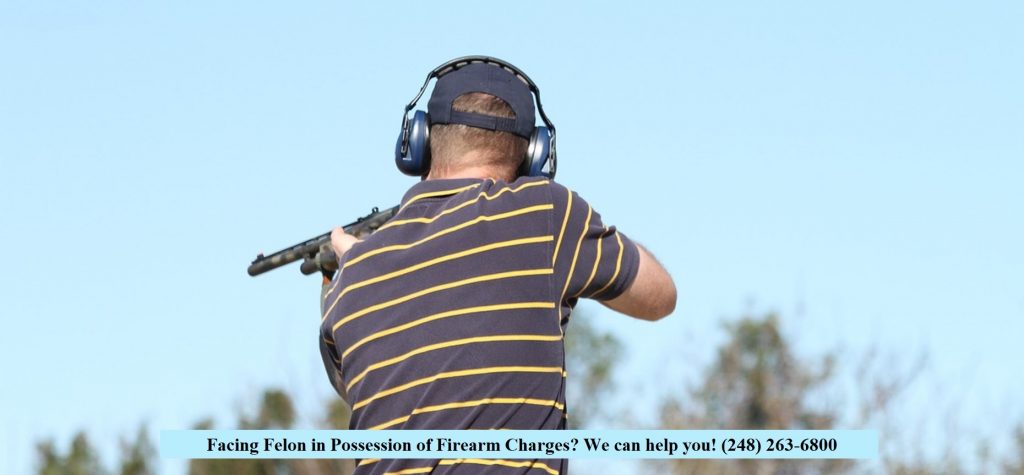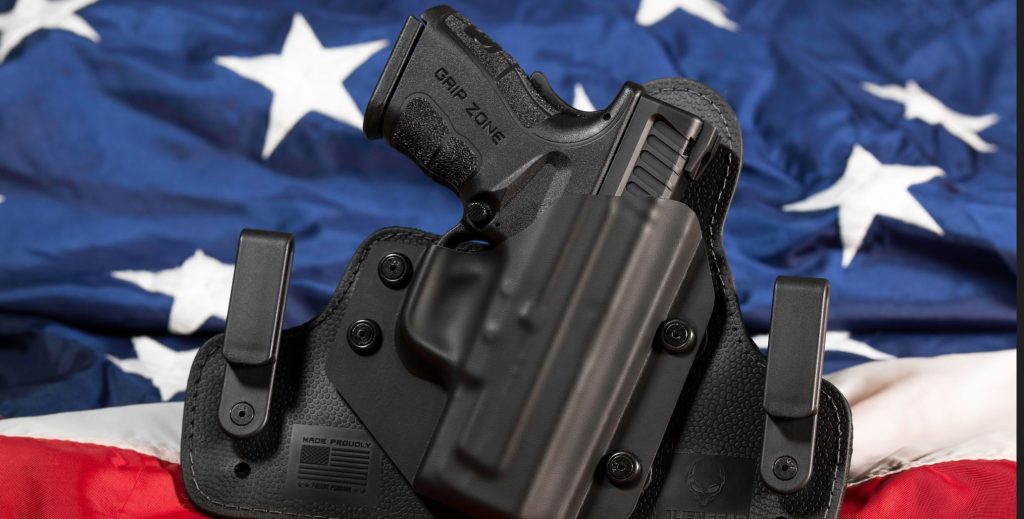Michigan Felony Charges for Being a Felon or Prohibited Person in Possession of a Firearm
If you are accused of possessing a firearm and have a previous felony or specified misdemeanor conviction, you need an experienced, respected defense lawyer to protect and defend you.

Your Best Defense Against Felon or Prohibited Person in Possession of a Firearm Charges
Michigan has certain legal restrictions on the possession, use, ownership, and transfer of firearms by individuals convicted of a felony or a domestic violence misdemeanor. Anyone convicted of domestic violence or a crime punishable by greater than one year faces up to five (5) years in prison if they own, possess, use, transfer, sell, or purchase a gun. Michigan lawmakers amended the Felon in Possession of a Firearm Statute in 2023 to include those convicted of felony offenses punishable by a year or more. Before the amendment, the statute defined a felony as an offense with a maximum sentence exceeding four (4) years. The statute also prohibits individuals convicted of domestic violence from using, possessing, or owning firearms.
Prohibited Person in Possession of a Firearm: Someone with a felony or domestic violence conviction or who otherwise unlawfully possesses, uses, transports, sells, carries, ships, receives, or distributes a firearm is guilty of a felony punishable by up to five (5) years imprisonment, five (5) years of probation, and $5,000.00 in fines.
What “domestic violence” offenses make someone a prohibited person?
The law defines what persons are prohibited from possessing firearms due to misdemeanor “domestic violence” convictions. The definition of domestic violence offenses is very broad and includes the following:
- Domestic Violence
- Aggravated Domestic Violence
- Domestic Violence 2nd Offense
- Entering Without Owner’s Permission
- Vulnerable Adult Abuse – 4th Degree
- Malicious Destruction of Personal Property -Under $200, $200 – $1,000, or Second Offense
- Malicious Destruction of a Building – Under $200 and $200 to $1,000
- Stalking
- Malicious Use of a Telecommunications Device
- Any ordinance or out-of-state law substantially corresponding to any listed offenses.

Michigan Right to Possess Firearms After Conviction
According to the Michigan Penal Code ( MCL 750.224f), any person convicted of a felony or specified domestic violence cannot possess, use, transport, sell, purchase, carry, ship, receive, or distribute a firearm in Michigan for a period of either three (3) or five (5) years, depending on their underlying felony conviction. The period begins after the person with the felony conviction has paid all fines, served any term of incarceration, and completed probation or parole.
Felonies requiring five (5) years are as follows:
- An element of that felony is the use, attempted use, or threatened use of physical force against the person or property of another or that, by its nature, involves a substantial risk that physical force against the person or property of another may be used in the course of committing the offense.
- An element of that felony is the unlawful manufacture, possession, importation, exportation, distribution, or dispensing of a controlled substance.
- An element of that felony is the unlawful possession or distribution of a firearm.
- An element of that felony is the unlawful use of an explosive.
- The felony is burglary of an occupied dwelling, breaking and entering an occupied dwelling, or arson.
Defenses Against Felon in Possession of Firearm Charges
Every case is defensible! The Defense Team with LEWIS & DICKSTEIN, P.L.L.C. has extensive experience defending clients against firearms charges, including Felon or Prohibited Person in Possession of a Firearm. Our attorneys are adept at providing rigorous, robust defenses based on facts, law, and equity or mitigation.
Factual Defenses
Factual defenses include lack of identification, mistaken identification, failure to prove possession, and lack of evidence of a qualifying firearm. For example, suppose a felon possessed a starter pistol or replica pistol. They would have a factual defense because that item cannot fire a dangerous projectile. Alternatively, someone might falsely accuse someone with a felony or specified domestic violence conviction of possessing a firearm out of spite, mistake, or to get revenge. If the person did not actually or constructively possess a gun, they are not guilty.
Note: Viable defenses do not include that the firearm was inoperable, as long as it once was operational or could be made to be operational again, or that the alleged offender did not know the law. Also, possession of ammunition, even without a firearm, still qualifies for this felony offense.
Legal Defenses
Some defenses, such as self-defense, impossibility, duress, and necessity, are legal defenses. In these cases, the defendant might agree they have a specified domestic violence or felony conviction and possessed a firearm; however, the law provides them a defense to prosecution or conviction. For example, suppose someone is in a store, and there is an armed robbery. Because their life is in imminent danger, they can lawfully pick up a firearm and defend themselves or others. Similarly, suppose an individual with a pistol attacks someone with a previous felony conviction. In that case, the felon or prohibited person can legally disarm the attacker, temporarily possess the firearm, and defend themselves or hold the person under citizen’s arrest until law enforcement arrives.
Mitigation or Equitable Defenses
Sometimes, there is little or no factual or legal defense to Possession of a Firearm by a Felon or Prohibited Person. A mitigation or equitable defense strategy might be most effective in these cases. For example, someone with a felony or specified domestic violence conviction might have been unaware of the change in Michigan’s law, which increased the scope of felonies and misdemeanors that prohibited possession of firearms from four-year maximum offenses to those punishable by more than one year. If the prosecutor believes there was a genuine mistake, they might be willing to reduce or dismiss charges. A savvy, persuasive defense lawyer might base a mitigating or equitable defense on their client’s minimal criminal record, excellent work history, significant family obligations, health concerns, history of rehabilitation, community service or volunteer record, and more.

Possession of a Firearm After an Expungement or Pardon
Michigan’s Possession of a Firearm by a Felon or Prohibited Person law does not apply to someone with an expunged, set aside, or pardoned conviction, unless the expunction, order, or pardon expressly provides that the person shall not possess a firearm or ammunition. Anyone with a felony or specified misdemeanor conviction who wants to own or possess a pistol, rifle, or shotgun should consider filing for an expungement or set aside at the earliest possible time.
Anyone with an expunged felony or specified misdemeanor can legally possess a gun in Michigan as long as:
- a law doesn’t otherwise bar them from owning a firearm, such as those with protection orders against them, on bond or probation, or with a history of involuntary psychology-related commitment.
- they possess a legal firearm (no machine guns, for example).
- they possess a firearm for lawful use (no intent to commit a crime).
- they follow Michigan law (such as transporting only a locked, secured firearm separate from ammunition)
“Should I file a Motion for Restoration of Firearm Rights?”
Suppose more than three or five years have passed, depending on the conviction. Is there a reason to file a Motion for Restoration of Firearm Rights? Yes! It is in anyone’s best interest to seek a court order restoring firearm rights to avoid any unwanted contact or complications from law enforcement. Unfortunately, many police officers are unaware of the limitations of Michigan’s Felon and Prohibited Person in Possession of Firearms law.
Furthermore, Michigan firearm rights restoration does not bind the federal government. The United States can prosecute a felon, even if the state has automatically restored their firearm rights. This said, the U.S. Attorney’s office is much less likely to charge and prosecute someone with a court order restoring their rights.
Possession of a Firearm within Eight (8) Years of a Domestic Violence Conviction
It is a 5-year felony in Michigan to possess a firearm within eight (8) years of fulfilling all conditions of probation, including paying fines, for a domestic violence-related conviction. Prohibiting offenses include misdemeanor domestic violence, any of the specified misdemeanors above, and many felony offenses resulting from a domestic situation, including but not limited to felonious assault, criminal sexual conduct, and interference with a communications device.

Lawyer for Convicted Felon or Prohibited Person in Possession of a Gun Charge
If you or a loved one is accused of Possession of a Firearm by a Felon or Prohibited Person in Michigan, seeking the best legal representation is crucial. When you seek the best defense attorney for you, this is where LEWIS & DICKSTEIN, P.L.L.C., the premier Michigan criminal defense law firm, comes into play! Renowned for their exceptional expertise in criminal defense, the firm’s defense lawyers distinguish themselves with a unique team-based approach, ensuring that every angle of the defense is meticulously examined and addressed. Our seasoned defense attorneys are not just experienced; they are masters of zealous advocacy, tirelessly working to protect your rights. LEWIS & DICKSTEIN, P.L.L.C.’s clients benefit from a blend of aggressive representation and strategic, thoughtful defense that has consistently yielded extraordinary results. In the complex and often intimidating world of criminal law, having this powerhouse team by your side can be pivotal in turning the tide of your case in your favor. Call us for a free consultation, and we will explain how we can help you!
Call us today at (248) 263-6800 for a free consultation or complete an online Request for Assistance Form. We will contact you promptly and find a way to help you.








